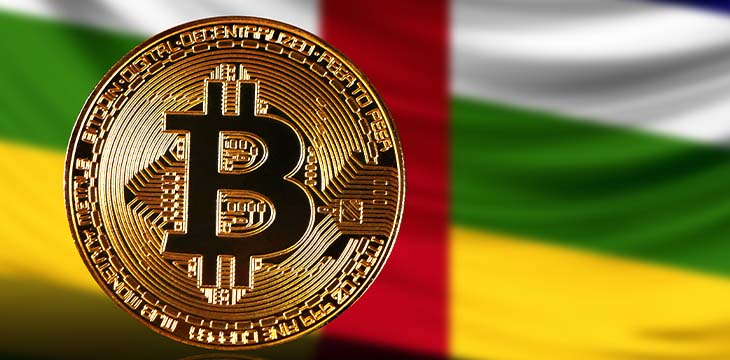|
Getting your Trinity Audio player ready...
|
The Central African Republic (CAR) has become the latest country to regulate the digital currency industry. Lawmakers in the country adopted a new bill to regulate the nascent industry and facilitate digital currency’s use in financial markets, local outlets report.
While several outlets have reported that CAR has adopted BTC as legal tender, just like El Salvador did, the country’s Minister of Finance, Herve Ndoba, has clarified that the African country has just created a regulatory framework that’s meant to foster the adoption and use of digital currencies in the local economy.
As part of the regulations, which the national assembly passed last week, the country is set to create a new regulatory body to oversee the industry. In an interview with Bloomberg, Ndoba said that he believes the new law will push CAR to the frontline in digital asset adoption, changing the narrative that African countries are always the last to adopt new technology.
“There’s a common narrative that sub-Saharan African countries are often one step behind when it comes to adapting to new technology. This time, we can actually say that our country is one step ahead,” the minister told Bloomberg.
He further clarified that the legislation isn’t in any way similar to El Salvador’s Bitcoin Law. This law was imposed by President Nayib Bukele last year, who bulldozed it through parliament. It forces all merchants in the country to accept BTC for payments, whether they want to or not, even as he uses precious national reserves to stack up on BTC. Ironically, Bukele views BTC as an investment tool that he claims will go to the proverbial moon, but he imposed a law that forces his people to use it as a currency.
This law was so draconian that even BTC enthusiasts disowned it and called Bukele out for it.
In CAR, the government isn’t seeking to push digital assets on the people. Instead, it seeks to protect them when they decide to use them. Justin Zacko, the Minister of Digital Economy, which was also in support of the law, commented that it would give the locals a better way to send money across borders, which has become increasingly difficult and expensive.
While the new law is a giant leap toward digital currency adoption in the CAR, several limiting factors could slow down such adoption. For one, Internet penetration in the country is the fifth lowest in Africa at just 11.3%, according to Statista.
In contrast, African countries leading in digital asset adoption have a very high Internet penetration, giving Bitcoin a much larger user base. Kenya leads the continent at 85% penetration. This translates to digital asset adoption as well, with the East African country ranking first globally for peer-to-peer trading volume two years in a row according to the Chainalysis Global Crypto Adoption Index.
Digital asset adoption in CAR will also be greatly hampered by the country’s economic struggles. Despite having vast reserves of gold and diamonds, it’s still one of the poorest countries in the world and the fifth-poorest in Africa. Years of internal conflicts have devastated the economy, with the most recent being a faceoff between the government and religious-based rebels.
While the government is fully behind legalizing digital assets in the CAR, yet another challenge could emerge from the country’s opposition leaders. Most of whom either voted against the bill or abstained from the vote altogether.
French state-owned outlet RFI reported that the leaders expressed ‘strong reservations’ against the bill, claiming that digital assets “will promote the laundering of dirty money and make the country a hotbed of tax evasion and fraud.”
Watch: CoinGeek Zurich panel, Blockchain & the Future of Africa

 03-05-2026
03-05-2026 




